| Srl | Item |
| 1 |
ID:
123538


|
|
|
|
|
| Publication |
2013.
|
| Summary/Abstract |
South-South cooperation is assumed to reflect a deep attitude of solidarity among nations of the global South. We point out that, although India, Brazil and South Africa (ibsa) present themselves as being in the vanguard of South-South cooperation, their foreign economic policies make such solidarity somewhat thin. We focus on examples in which these three states deliberately but also unintentionally create sub-optimal conditions for the development of some of their Southern neighbours. This outcome reflects the policies that emerging centres of accumulation in the South are promoting, as well as the material interests of the dominant class alliances in the aforementioned states. There is a need for close scrutiny of the foreign economic policies of dynamic developing economies, and for closer multilateral coordination among the states of the global South.
|
|
|
|
|
|
|
|
|
|
|
|
|
|
|
|
| 2 |
ID:
162917
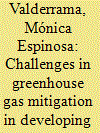

|
|
|
|
|
| Summary/Abstract |
CO2eq emission scenarios for the Colombian transport sector were estimated for 2010–2050. We used a marginal abatement cost approach to assess an emission mitigation pathway. For this purpose, we constructed a carbon emission accounting model linking travel demand to vehicle stock, fuel consumption, and emissions for the Colombian transport sector. Actions related to energy efficiency, fuel switching, new engine technologies and modal change were considered. The analyzed measures have the potential to reduce the cumulative emissions by 8% and 18% under the BAU scenario through 2030 and 2050, respectively. Mitigation costs are high and imply annual capital costs that range from 0.5% to 4% of the national GDP. Gains in efficiency as well as synergy with other sector objectives might help justify some of the actions in financial terms. Non-technological actions, such as high public transit participation in the urban modal share and reorganization of the freight system, play a significant role in attaining low-carbon transport systems in Colombia.
|
|
|
|
|
|
|
|
|
|
|
|
|
|
|
|
| 3 |
ID:
173972
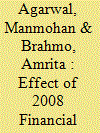

|
|
|
|
|
| Summary/Abstract |
There has been considerable debate over whether the USA is losing its stronghold over the world economy and its power declining, giving way to new leadership from the emerging economies (EEs) like China. This article uses the notion of power based on the resources available to a state. It uses a number of measures to measure the resources available to a state and so assess economic power. It finds that there has been a slight decline in the importance of the developed countries and an increase in that of the developing countries (DCs). However, there is a slight decline in the power of the USA. The increase in the importance of developing countries is mainly on account of China. But the changes do not mean that developing countries can get the changes they desire. There is more of a stalemate.
|
|
|
|
|
|
|
|
|
|
|
|
|
|
|
|
| 4 |
ID:
192408
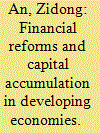

|
|
|
|
|
| Summary/Abstract |
This study uses newly constructed data on structural reforms and private and public capital stock to assess the effects of financial reforms on capital formation in developing economies. We find that while both domestic and external financial reforms are important determinants of capital formation, the former is more influential in middle-income countries (MICs) and the latter in low-income countries (LICs). For LICs, external financial reforms work mostly through attracting FDI. For MICs, within domestic financial reforms, what matters most are measures related to strengthening banking supervision and reducing credit controls. These results are driven by capital formation in the private sector. In addition, these effects are nonlinear, and it is important for a country's policy when it comes to the sequence of implementing domestic and external financial reforms. Given the importance of public investment in decarbonization, this study further discusses the potential impacts of financial reforms on climate change and carbon inequality.
|
|
|
|
|
|
|
|
|
|
|
|
|
|
|
|
| 5 |
ID:
086811
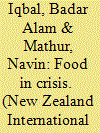

|
|
|
|
|
| Publication |
2009.
|
| Summary/Abstract |
The world is witnessing a food crisis. Surging food grain prices and worsening world supplies are now bringing the food crisis to the boil.The worst affected are the developing economies and least developed economies of the African continent.
|
|
|
|
|
|
|
|
|
|
|
|
|
|
|
|
| 6 |
ID:
186492
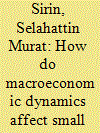

|
|
|
|
|
| Summary/Abstract |
Developing economies are currently projected to hold a major share of the global energy demand in the upcoming decades, giving them a key role in addressing climate change. However, new renewable energy investments in these countries have so far been relatively slow. A specific set of challenges dominate the investment environment in developing countries, including higher exposure to macroeconomic and political risks, uncertainties due to climate change, limited domestic manufacturing capabilities, and heavy reliance on foreign debt in capital investments. These factors tend to disproportionately affect small and medium-sized enterprises (SMEs) which currently hold a sizeable share of renewable and distributed energy technology investments. Not only does this impact the viability of energy transition, but also has important energy justice and local economic development implications – an overlooked subject in the literature. Using a rich, novel dataset and panel data methods, this paper estimates the effect of a set of key macroeconomic variables on the capital structure and investment outcomes of SMEs within the Turkish power sector. Our results indicate that unfavorable macroeconomic conditions, which lead to a significant growth in liabilities and increased risk of bankruptcy, can cause a slowdown in power sector SME investments despite the prevalence of subsidies.
|
|
|
|
|
|
|
|
|
|
|
|
|
|
|
|
| 7 |
ID:
193318
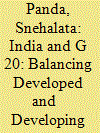

|
|
|
|
|
| Summary/Abstract |
India as president of G20 has to build consensus on important issues with careful approach. The concept of “Basudheiba Kutumbakam “and issues of Global South are to be addressed balancing the realities of developed and developing countries. Prime concern shall be economic growth ,averting cleavages in world economies and ensuring credibility in multilateral diplomacy in consonance with its goal” One Earth, One Family, One Future”.
|
|
|
|
|
|
|
|
|
|
|
|
|
|
|
|
| 8 |
ID:
104186
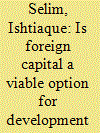

|
|
|
| 9 |
ID:
119391
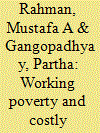

|
|
|